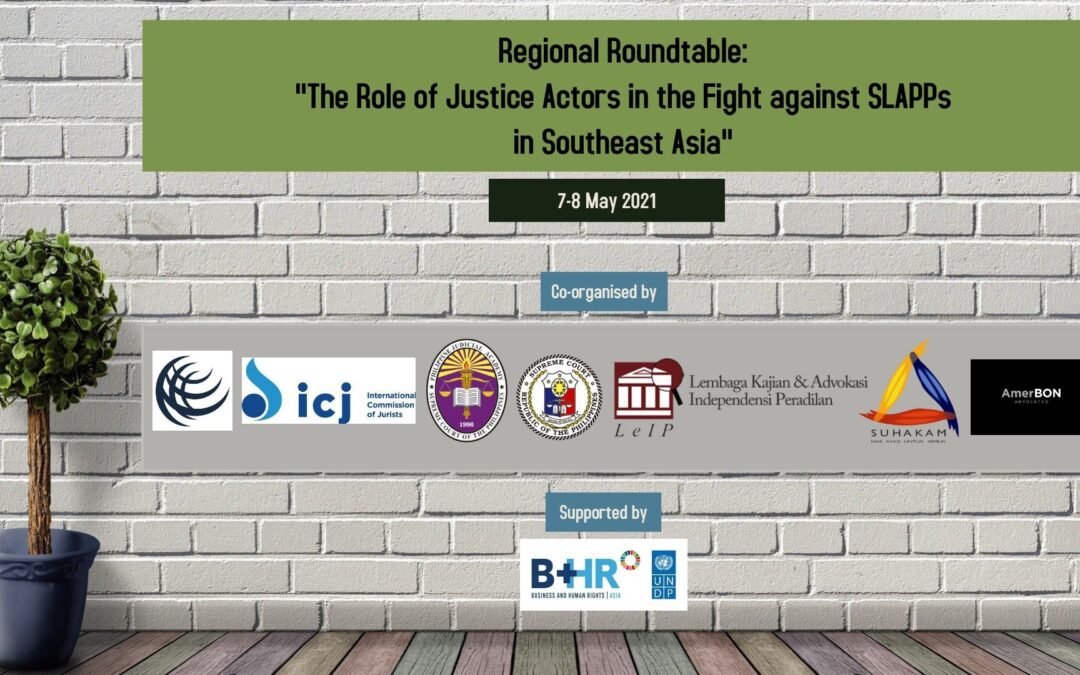
May 9, 2021 | News
Southeast Asian governments must diminish the misuse of lawsuits to harass and silence civil society, so-called SLAPP suites, said more than 70 international experts, judges, public prosecutors, lawyers, members of civil society organizations, academics, and members of executive and State institutions from Indonesia, Malaysia, the Philippines, and Thailand at a discussion convened by the ICJ and partners on 7 and 8 May.
The participants at the regional dialogue on “The Role of Administration of Judicial Authorities and Legislators in the Fight against Strategic Lawsuits Against Public Participation (SLAPPs) in Southeast Asia” addressed the proliferation of SLAPP suits, which SLAPP suits are undertaken with the principal objective of curtailing or deterring public criticism or opposition to certain activities by the entity initiating the legal action. SLAPP lawsuits typically have a “chilling effect” on the exercise of freedom of expression and other human rights and fundamental freedoms, including freedom of opinion and expression (article 19 of the International Covenant on Civil and Political Rights); freedom of peaceful assembly (article 21); and the right to take part in the conduct of public affairs (article 25).
Irene Khan, Special Rapporteur on the promotion and protection of freedom of opinion and expression, stated that it is necessary to bring exiting laws in compliance with international law and standards, including with the principles of legality, proportionate, necessity, legitimate purpose, and non-discrimination, and called for defamation laws to be decriminalized.
Prof. Surya Deva, Vice-Chairperson, the Working Group on the issue of human rights and transnational corporations and other business enterprises, referred to several anti-SLAPP provisions that, in his view, are inadequate, including section 161/1 and 165/2 of Thailand’s Criminal Procedure Code. He pointed out that while the legal reform needed, States also need to train relevant stakeholders who will make use of these. Internal or soft guidance can also be a helpful guideline on how to exercise discretion, and more resources should be allocated to raise awareness.
Several participants, while noting their duties to protect rights to access to justice and the power imbalance between the parties in SLAPP lawsuits, called for a robust legal frameworks and policies that prevent the filing SLAPPs in the first place and allow relevant authorities to identify, call out and dismiss them as soon as they are filed.
In the jurisdictions where such mechanisms exist, participants highlighted the need to address certain gaps to allow authorities to promptly and effectively exercise their power, and the importance of guidelines that can guide the relevant authorities on how to handle and proceed with SLAPPs in a coordinated effort to raise awareness among justice sector actors on this topic.
In the absence of a specific Anti-SLAPP legislation, participants also shared their experience using existing tools in their domestic laws as a basis in combating SLAPPs, including several provisions of the constitutions, other early dismissal mechanism provided in procedural laws, provisions under international laws, and encouraged their peers to think out of the box.
Reforming individual causes of action that commonly form the basis of SLAPPs, such as defamation, to ensure their compliance with international law and standards were also discussed by participants as another approach that the governments should consider, in combination with other measures.
Remedies for persons negatively affected by SLAPP lawsuits were encouraged.
The Workshop was conducted in collaboration with Business & Human Rights Resource Centre (BHRRC); Philippine Judicial Academy; the Supreme Court of the Republic of the Philippines; Lembaga Kajian dan Advokasi Independensi Peradilan (Indonesian Institute for Independent Judiciary or LeiP); Human Rights Commission of Malaysia (SUHAKAM) and AmerBON Advocates.
The speakers at the workshop were: representatives of all partner organizations; Nikhil Dutta, Global Programs Legal Advisor of the International Center for Not-for-Profit Law (ICNL); Joel Hernández García, Inter-American Commission on Human Rights’ Rapporteur on the Rights of Human Rights Defenders and Justice Operators; Irene Khan, Special Rapporteur on the promotion and protection of freedom of opinion and expression; and Prof. Surya Deva, Vice-Chairperson, the Working Group on the issue of human rights and transnational corporations and other business enterprises.
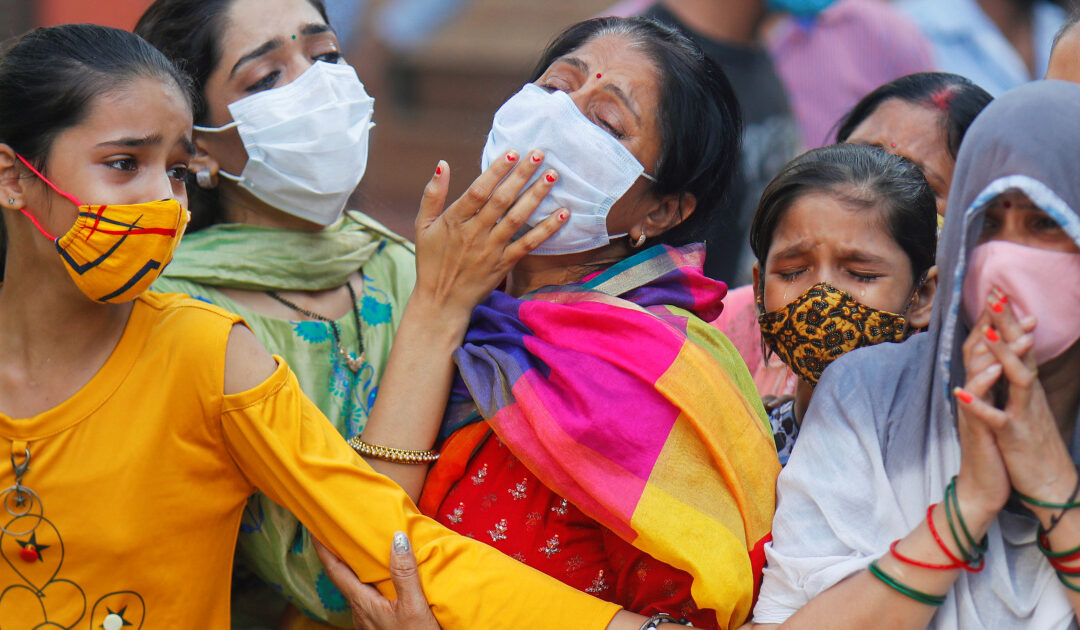
May 7, 2021 | News
As the European Union and India prepare for a meeting of their leaders on 8 May they should jointly commit to a strategy for protecting all people in India from the devastating second wave of the Covid-19 pandemic now ravaging the country, said the ICJ today.
India has faced unprecedented impact from the pandemic since 15 April, with some 400,000 daily cases and a daily death toll now officially around 4,000 and likely even higher. India’s healthcare system and infrastructure has strained to meet the needs of people for oxygen, medicines, testing, hospital beds, ambulances, and doctors. India, a vaccine-production powerhouse globally, has only vaccinated just over two percent of its population and is now facing severe shortage of vaccines.
“The scenes emerging from India are horrifying but unfortunately not unexpected. This global pandemic demands global cooperation and national competence and this is the moment for the EU and India to demonstrate cooperation and competence. The Indian government was lecturing the world about its performance instead of preparing for the predictable resurgence of the pandemic, and now it is busy silencing people demanding help or criticizing the government’s poor performance,” said Sam Zarifi, ICJ’s Secretary-General.
The ICJ added that the performance of the EU and its Member States in international cooperation to tackle COVID globally left much to be desired, particularly as they have resisted supporting a loosening of intellectual property restrictions that have hampered efforts at wider vaccine production and distribution.
“At the same time, the proposal by India and South Africa for removing global patent restrictions for vaccine protection was rejected by some of the wealthiest governments, including the EU, who seem more focused on economic interests rather than global responses to a global pandemic,” said Zarifi.
The EU has already agreed to assistance to India through its Civil Protection Mechanism and individual EU countries have delivered some needed supplies and vaccines.
“The EU and Member States should increase aid efforts to India and immediately reverse their opposition to waiving intellectual property restrictions to vaccine production under the World Trade Organization TRIPS agreement, especially now that the United States has indicated it would end its obstructionism. The EU should not be on the wrong side of history as the last obstacle to global vaccine production,” Zarifi said.
The ICJ also urged the EU to remind the Indian government of its obligations under international law and guarantees of the Indian Constitution to protect the rights of people in India to life and to health.
“The summit between the European Union and India brings together powerful States who should use this opportunity to align their actions at the global, regional, and national levels to protect people from the pandemic,” said Zarifi. “International law provides the framework for cooperation and both the EU and India must do a better job of complying with their international legal obligations.”
Additional Information
India’s judiciary has at various levels has severely criticized the Indian Central and State governments and issued orders for urgent remedial responses.
In particular, the Indian Supreme Court has ordered the central government to:
- ensure adequate supply of oxygen through provision of emergency buffer stock by the central government in collaboration with state governments;
- develop a national policy on admission to hospitals and in the interim ensure that no patient is denied access to hospitals or essential drugs; and
- recognize vaccines as a “valuable public good”.
The Supreme Court has also questioned the constitutionality of India’s vaccine policy due to differential pricing for state governments, the central government and private hospitals, stating that the government needs to revisit the policy so that it “withstands the scrutiny of Articles 14[right to equality] and Article 21[right to life] of the Constitution”.
Additionally, the Supreme Court has suggested that the Central Government take steps to ensure access to essential drugs as well as to enhance its healthcare workforce as needed, in line with India’s constitution and its international legal obligations.
As party to the International Covenant of Economic, Social and Cultural Rights, India is required to take all necessary measures to ensure the “prevention, treatment and control of epidemic” and to create conditions “which would assure to all medical service and medical attention in the event of sickness”. Further, these obligations, as stressed by the UN Committee on Economic, Social and Cultural Rights entail removing any discrimination in vaccine access; guaranteeing affordability and economic accessibility of vaccines for all people; prioritizing physical accessibility to vaccines, especially for marginalized groups and people living in remote areas; and guaranteeing access to relevant health information.
Additional Reading
EU: prioritize rights at India Summit, provide essential medical supplies, urge India to free rights defenders, address abuses – ICJ Press Release, 3 May 2021
Indian Government Fails to Protect Right to Life and Health in Second Wave of COVID-19 Pandemic – ICJ Press Release, 29 April 2021
Contact
Osama Motiwala, ICJ Asia-Pacific Communications Officer, t: +66-62-702-6369; e: osama.motiwala(a)icj.org
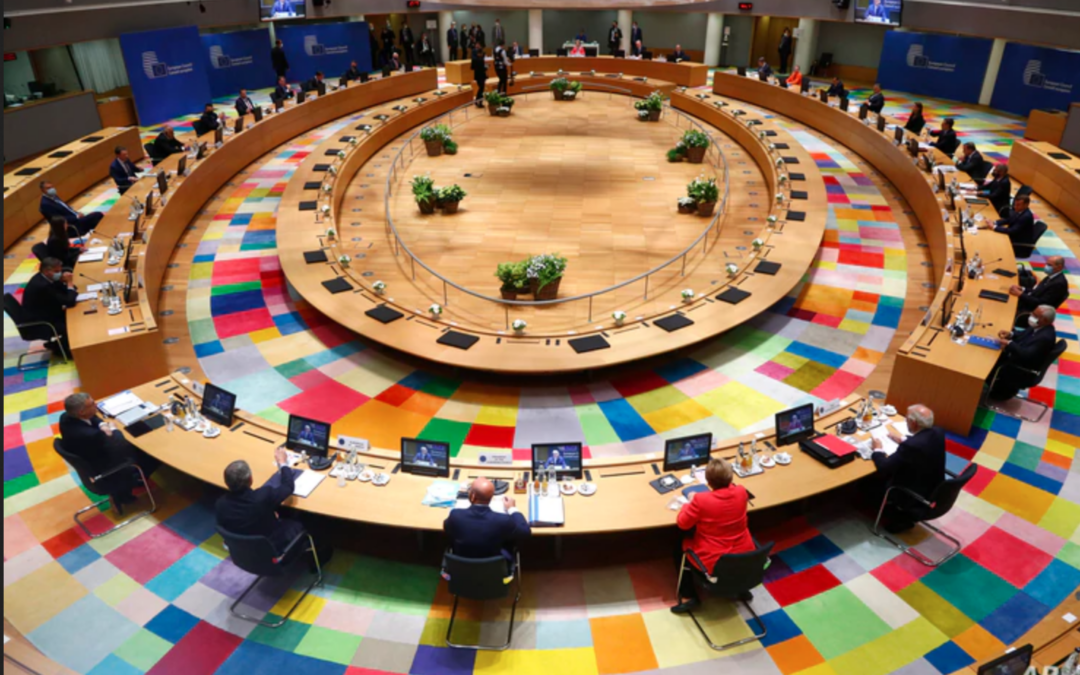
May 3, 2021 | News
European leaders at the May 8, 2021 summit with their Indian counterparts should prioritize the deteriorating human rights situation in India, including the right to health, the ICJ and seven other organizations said today.
With a devastating Covid-19 crisis affecting the country, Europe should focus on providing support to help India deal with the acute shortage of medical supplies and access to vaccines. At the same time, European leaders should press the Indian government to reverse its abusive and discriminatory policies and immediately release all human rights defenders and other critics who have been jailed for peacefully exercising their rights to freedom of expression and peaceful assembly.
The organizations are Amnesty International, Christian Solidarity Worldwide (CSW), Front Line Defenders (FLD), Human Rights Watch, the International Commission of Jurists (ICJ), International Dalit Solidarity Network (IDSN, International Federation for Human Rights (FIDH), and World Organisation Against Torture (OMCT).
India has the fastest-growing number of Covid-19 cases in the world and is facing severe healthcare shortages – of testing capacity, medicines, ambulance services, hospital beds, oxygen support, and vaccines. The European Union and its member states should reconsider and reverse their opposition to India and South Africa’s proposal before the World Trade Organization to temporarily waive certain intellectual property rules under the TRIPS Agreement to facilitate increased manufacturing and production of vaccines and related products globally, until widespread vaccination is in place the world over.
The Covid-19 crisis has also highlighted growing human rights concerns in India.. Faced with widespread criticism of its handling of the pandemic, the Indian government has tried to censor free speech, including by ordering social media content taken down and criminalizing calls for help. The government has also ignored calls from the United Nations Office of the High Commissioner for Human Rights for countries to release “every person detained without sufficient legal basis, including political prisoners, and those detained for critical, dissenting views” to prevent the growing rates of infection everywhere, including in closed facilities such as prisons and detention centers.
Instead, the Hindu nationalist Bharatiya Janata Party (BJP)-led government has increasingly harassed, intimidated and arbitrarily arrested human rights defenders, journalists, peaceful protesters, and other critics, including under draconian sedition and counterterrorism laws.
The authorities have jailed a number of human rights defenders, student activists, academics, opposition leaders, and critics, blaming them for the communal violence in February 2020 in Delhi as well as caste-based violence in Bhima Koregaon in Maharashtra state in January 2018. In both cases, BJP supporters were implicated in the violence. Police investigations in these cases were biased and aimed at silencing dissent and deterring future protests against government policies, the groups said.
The government uses foreign funding laws and other regulations to crack down on civil society. Recent amendments to the Foreign Contributions Regulations Act (FCRA) added onerous governmental oversight, additional regulations and certification processes, and operational requirements, which adversely affect civil society groups, and effectively restrict access to foreign funding for small nongovernmental organizations. In September 2020, Amnesty International India was forced to halt its work in the country after the Indian government froze its bank accounts in reprisal for the organization’s human rights work, and many other local rights groups struggle to continue doing their work.
The Indian authorities have also enacted discriminatory laws and policies against minorities. Muslim and Dalit communities face growing attacks, while authorities fail to take action against BJP leaders who vilify minority communities, and against BJP supporters who engage in violence. The Indian government has imposed harsh and discriminatory restrictions on Muslim-majority areas in Jammu and Kashmir since revoking the state’s constitutional status in August 2019 and splitting it into two federally governed territories.
The authorities carried out counterterrorism raids in October on multiple nongovernmental organizations in Kashmir and Delhi, and a newspaper office in Srinagar to silence them, causing a chilling effect on human rights defenders who fear for their safety.
Yet, despite the considerable deterioration in the country’s human rights record under Prime Minister Narendra Modi, the Indian government has effectively shielded itself from the international scrutiny and reactions that the seriousness of the situation should have warranted. Focusing on strengthening trade and economic ties with India, the European Union and its member states have been reluctant to formulate public expressions of concern on human rights in India, with the exception of occasional statements focused solely on the death penalty.
To read the full statement, click here.
Contact:
Sam Zarifi, ICJ’s Secretary General, t: +66 627026369, e: sam.zarifi(a)icj.org
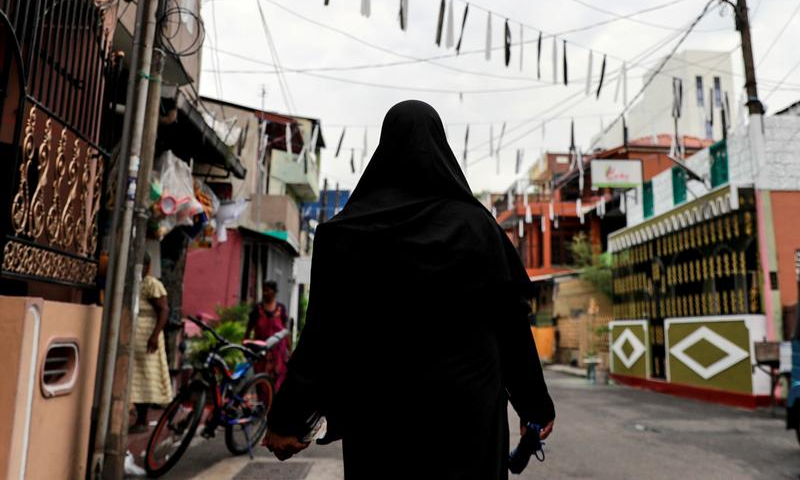
Apr 30, 2021 | News
The ICJ today condemned the Sri Lankan cabinet’s approval of the proposed ban on face coverings, which, if adopted by Parliament would directly discriminate against Muslim women
The Cabinet on 27 April approved the proposal put forward by Minister of Public Security Sarath Weerasekara on March 13 to ban face coverings including the burqa and niqab citing national security grounds.
The ICJ has called on the Sri Lankan Parliament to categorically reject this discriminatory proposal as a violation of the right to freedom of religion.
“The Sri Lankan Government’s justification for banning face coverings rings hollow during a time when it has quite sensibly made the wearing of face masks in public mandatory to address the COVID-19 pandemic,” said Ian Seiderman, ICJ’s Legal and Policy Director.
The Government of Sri Lanka temporarily banned full-face coverings by way of an emergency regulation in the aftermath of terrorist attacks on Easter April 2019, in which 269 people were killed and at least 500 others injured. This ban resulted in the stigmatization and harassment of Muslim women, including those who were only wearing a hijab (head covering).
“While the Sri Lankan Government has an obligation to protect its inhabitants from the threats to their lives and well-being, that protection is a part of, and not in conflict with, its overall duty to protect human rights,” said Ian Seiderman.
Freedom of religion and belief is guaranteed under article 18 of the International Covenant on Civil and Political Rights (ICCPR), to which Sri Lanka is a party. Freedom to have or adopt a religion or belief of one’s choice is similarly guaranteed by Article 10 of the Sri Lankan Constitution. Article 14 (1) (e) ensures the freedom to manifest one’s religion in worship, observance, practice and teaching.
The UN Human Rights Committee has affirmed that under the ICCPR “the observance and practice of religion or belief may include not only ceremonial acts, but also such customs as the wearing of distinctive clothing or head coverings.”
The ICJ concurs with Ahmed Shaheed, the UN Special Rapporteur on Freedom of Religion or Belief, who has stressed that “burqa bans are incompatible with international law guarantees of the right to manifest one’s religion or belief and of freedom of expression.”
“While the authorities may take necessary and proportionate steps to confirm a person’s identity to meet a specific security concern, a blanket ban on face coverings in the name of national security does not hold water,” Seiderman said. “It would invariably result in discriminatory practices and lead to the stigmatization of Muslim women,” he added.
Under ICCPR article 18(3) any limitation on freedom of religion must be non-discriminatory and must be necessary and proportionate to protect public safety, order, health, or morals or the fundamental rights and freedoms of others.
The UN Human Rights Committee has consistently held that under international law, a blanket ban on face coverings cannot be justified as necessary or proportionate to its stated legitimate aim of promoting public safety, while recognizing the need for States, in certain contexts, to be able to require that individuals show their faces. Even this restriction, however, would generally only apply to veils that fully cover faces and not, for example, to head coverings.
Contact
Osama Motiwala, ICJ Asia-Pacific Communications Officer, e: osama.motiwala(a)icj.org
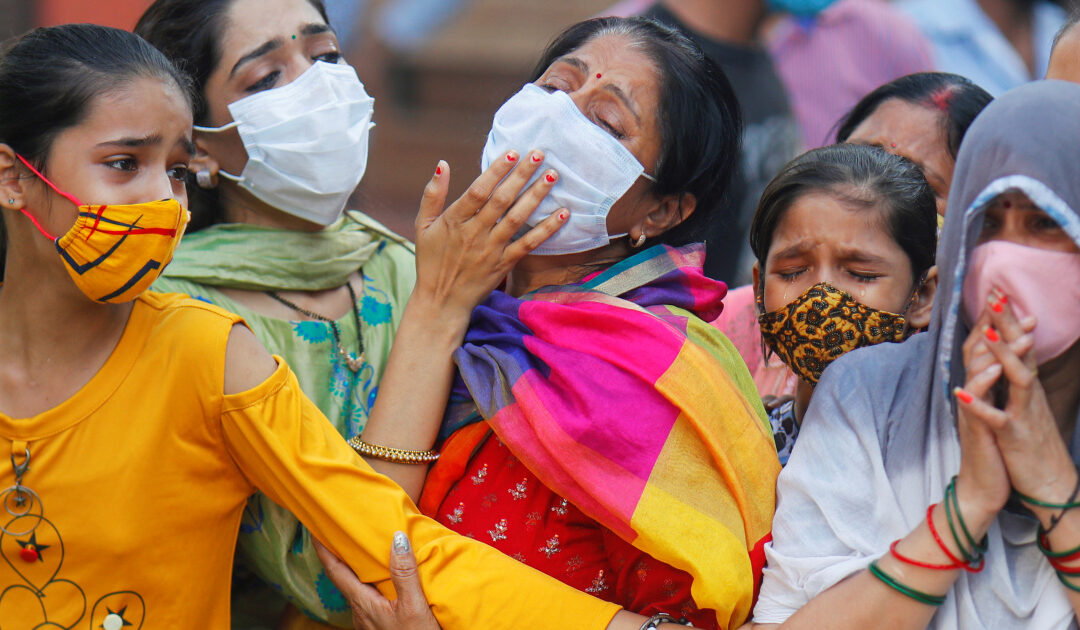
Apr 29, 2021 | News
The Indian Government must urgently remedy failures that have aggravated the impact of the second wave of the Covid-19 pandemic and led to people in the country suffering record-high rates of infection and death, said the ICJ today.
The ICJ urged India’s central and state governments to comply with judicial orders regarding guaranteeing access to adequate, timely and nominally priced oxygen supply, hospital beds, COVID-19 medicines, COVID-19 tests and vaccines, in line with India’s constitutional and international legal obligations.
“The Indian federal and state governments failed to prepare for the predictable second wave of the COVID-19 pandemic, aggravating the horrific impact of the pandemic and the avoidable tragedy of between 1,500 to over 3,000 deaths daily,” said Sam Zarifi, ICJ’s Secretary General.
Since 15 April India has reported more than 200,000 cases per day and on 27 April, it reported 360,960 – the highest globally – in a devastating second wave, with the official number of deaths hovering at over 1,500 – 3,000 per day, and feared to be higher actually.
Many hospitals have reportedly turned away patients due to lack of space and some hospitals have reportedly asked those they admit to sign forms accepting the risk in case of death caused by exhaustion of oxygen supply.
The government’s failures have driven people to seek recourse in the courts. At least 11 High Courts across the country have taken cognizance of the crisis and have passed orders regarding matters including access to oxygen supply and oxygen tankers, access to medicines such as Remdesivir and to hospital beds; restriction on black marketing and private hoarding of medicines and oxygen; and prevention of violations of COVID19 regulations relating to mask wearing and social distancing.
Courts have also ordered that accurate data on COVID19 cases and deaths be relayed by the state government. The Indian Supreme Court also took suo moto cognizance of the issue and has called for a report from the central government on issues related to supply of oxygen, essential drugs, vaccine pricing.
The Delhi High Court on 21 April asked the central government to ensure that “the emergent needs of various hospitals in Delhi… would be met so that no causalities are suffered on account of discontinuing the supply of Oxygen to seriously ill COVID patients.” On 27 April, the Delhi High Court asked the Delhi government to ensure transparency in accounting of supply of oxygen and drugs to prevent hoarding and black-marketing.
The Bombay High Court on 22 April gave directions to ensure uninterrupted oxygen supply to city hospitals, access to medicines and beds, and tests.
“While the ICJ commends the Indian judiciary in trying to respond to this crisis urgently, the fact remains that a lack of a national public health strategy by the Indian Government has resulted in acute shortages of essential drugs, oxygen, and hospital beds in places where they are needed,” said Zarifi.
India is obligated under Article 12, International Covenant on Economic, Social and Cultural Rights (ICESCR), to guarantee the right to health. Under Article 12(c), ICESCR, the Indian State is required to prevent, treat and control all diseases including epidemic diseases such as COVID-19. Moreover, Article 12(d), ICESCR, requires India to create conditions that allow for “medical service and medical attention” to all in the event of a sickness, such as COVID-19. The minimum core obligations under Article 12, ICESCR, include, among others, provision of essential drugs, and a national public health strategy and a plan of action on the basis of epidemiological evidence, addressing the health concerns of the whole population. The Indian State has failed egregiously in meeting its minimum core obligations under the right to health.
The ICJ recommends, in line with decisions of Indian courts, that the Indian federal government work effectively with various state governments and other entities to remove bottlenecks in supply of medicines and oxygen, and set up additional facilities for COVID19 patients. The Indian government must also promote and model COVID appropriate behavior such as masking and social distancing and begin preparing for any subsequent waves of the pandemic.
Contact
Maitreyi Gupta, ICJ India Legal Adviser, t: +91 77 560 28369 e: maitreyi.gupta(a)icj.org







